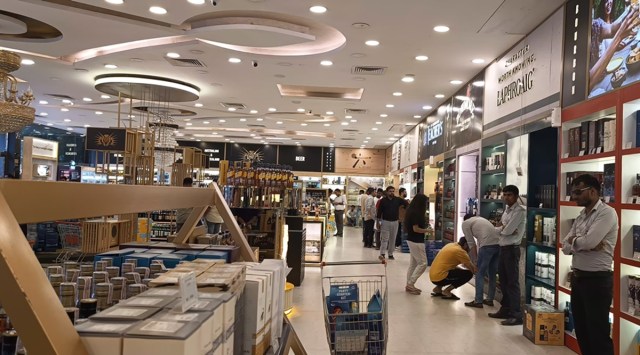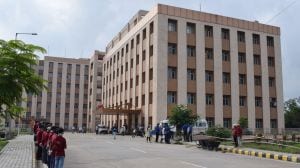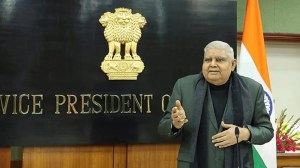Metro nod to alcohol, trouble in Delhi: Why Gurgaon’s liquor sales are on a high
An excise official said competition from Punjab, Uttar Pradesh and Delhi, which participated in the auction this year, has increased because the policy is liberal as compared to those of other states and prices are low, driving many companies to make a foray into the business in Haryana.
 For Gurgaon’s already booming liquor industry, the DMRC’s announcement, coupled with the controversies over Delhi’s liquor policy, has given a fillip for business. (Representational image)
For Gurgaon’s already booming liquor industry, the DMRC’s announcement, coupled with the controversies over Delhi’s liquor policy, has given a fillip for business. (Representational image) At Millennium City Centre Gurugram Metro station, CISF personnel overseeing bag scanners now have one less thing to look out for — liquor bottles. After the Delhi Metro Rail Corporation (DMRC) on June 30 clarified that two sealed liquor bottles are allowed on its trains, personnel make sure the bottles are sealed and the permitted amount is being carried.
Said a CISF personnel at gate two, “We have been directed to allow people to carry liquor in sealed bottles. If the bottle is not sealed or if there are more than two, we confiscate the alcohol… Moreover, passengers have just begun to realise the rule has set in.”
Another personnel at gate 3 said that though it has just been a few weeks, people have started taking alcohol.
For Gurgaon’s already booming liquor industry, the DMRC’s announcement, coupled with the controversies over Delhi’s liquor policy, has given a fillip for business.
The Delhi Excise Policy 2021-22, which offered big discounts for consumers like ‘buy one, get one free’, ‘two-plus-three’ on MRP of liquor price, was scrapped on July 31 last year amid allegations of corruption and irregularities in the policy’s drafting and implementation. The AAP-Delhi government decided to bring back the old excise regime, under which only government-run liquor shops are allowed, and all discounts and offers were discontinued.
The effect was seen in Gurgaon. During the auction for vends under Haryana’s excise policy for 2023-24 — rolled out on June 12 — there was a rush by bidders to set up stores in areas close to Delhi. This led to an increase in the auctioned amount in zones near the border as compared to last year. For instance, Mehrauli border in Gurgaon East emerged as the highest bid zone — Rs 43 crore against a reserve price of Rs 22 crore. Udyog Vihar border saw the third highest bid in Gurgaon West — Rs 25.8 crore against a base price of Rs 17.8 crore.
Sales boom
Several liquor businesses have affirmed that there has been an increase in footfall after the issues in Delhi due to its excise policy. “Wine shops, especially on the border such as in Rajokri and Mehrauli, have seen a spike in customers. The number of people frequenting Golf Course Road shops has also risen. We are now expecting more people with the DMRC announcement. Either way, we are in a comfortable position in terms of sales,” said Ravi Gupta, general manager of G-Town Wines, a popular outlet across Gurgaon.
Honey Tiwari, in-charge of Discovery Wines, another leading liquor chain, said Gurgaon has always enjoyed the tag of being the most sought-after city for alcohol. “Sales have always been good here, but after last year, we have seen better profits. After the DMRC order, we have been getting calls asking if there are discounts as more people are expected to come. We have had customers living in Delhi and working here buying a bottle or two, that’s how I came to know that Metro allows liquor bottles now,” he added.
The Indian Express spoke to several customers on what attracts them to Gurgaon’s stores.
At a bustling Discovery Wines L2 vend in Sikanderpur, stocked with liquor of all shapes, sizes and colours, Abhishek (35) from Faridabad buys four bottles of scotch to take home. He said he buys alcohol from Gurgaon twice a month as there are more imported brands here than anywhere in NCR.
At the counter, carrying four cartons of vodka, scotch, gin, and whisky, a group of five get their order packed in a gunny sack.
Store manager Anil Pandey said sales have increased by 10-15% this year, but it had hit a high when Delhi revoked its policy and people started coming in droves. “This year, when the auction took place, there was an increase of 35% in the licence fee. So we are yet to get our sales to that point to compensate for it,” he said.
Taking a carton of seven bottles of alcohol, Akshay (25) said he comes to Gurgaon from South Delhi at least twice a month: “It’s cheaper here and we get a lot more options. There are 2-3 outlets in the area where I live but none of them have an imported liquor collection like Gurgaon.”
His friend Digvijay said that in the capital, they have to stand in queues for any order. “There is so much rush there; it’s feasible to come to Gurgaon than get liquor from Delhi,” he added.
Sandesh comes all the way from Rohini to get liquor: “I stock up every three months. Delhi shops do not offer foreign liquor, and even the ones that are sold there are cheaper in Gurgaon. Black Label costs Rs 2,400 in Gurgaon while in Delhi, it’s for Rs 3,400. Though it’s a little far away, who wouldn’t come here.”
Pandey said though he has noticed people buying two bottles, a clearer picture will emerge after the quarter ends since the DMRC policy has just kicked in.
At a G-Town Wines outlet on MG Road, which has beer cans to liquor worth Rs 50,000 and more, manager Ravinder Yadav said their licence fee saw a huge hike this year and these two months have not seen a significant jump in sales. “We expect sales to go further up during festive season,” he said, alluding to the ongoing month of Sravan.
At another Discovery Wines outlet near Guru Dronacharya Metro station, where people were drinking on one side of the shop and many had come in cars, Tejpal (28) from Aya Nagar was getting a bottle to take on the metro.
“Once I took a bottle of beer, and was worried that someone would flag this, but no one said anything. That’s when I knew it had become common,” he said.
The manager of the outlet, Sunny Sheokand, said many people have been taking two bottles after the DMRC order. “We don’t enquire about their whereabouts, but people have been discussing how they can take it on the metro now,” he said.
A lucrative policy
According to the Excise department, Gurgaon city, spread across 232 sq km and home to around 15 lakh residents, collected Rs 1,474 crore as revenue (licence fee and excise duty) in 2020-21. Revenue rose to Rs 1,971 crore in 2021-22. A year later, the department collected Rs 2,528.86 crore, an increase of 28%.
An excise official said competition from Punjab, Uttar Pradesh and Delhi, which participated in the auction this year, has increased because the policy is liberal as compared to those of other states and prices are low, driving many companies to make a foray into the business in Haryana.
Moreover, according to this year’s policy, there would be no maximum retail price, but a ‘minimum’ retail sale price, under which vends are free to sell liquor at any amount above it. “No maximum sale price is fixed for any of the above for the policy year 2023-24,” it stated.
This is the first time a base price has been fixed. A senior official from the excise department said they will conduct an inspection to check if the shops sell for less than the minimum price.
Excise revenue collection (excluding GST collection) has also shot up over the years in the city, said Pawan Ohlyan, assistant to the deputy excise and taxation commissioner (west). “The licence amount has increased after the Delhi policy issue; Gurgaon (West) has already collected Rs 140.57 crore this June,” he added.
An excise official further said a spurt in sales was witnessed after the Covid-induced lockdown was lifted. “We now get numerous requests for a one-day licence to serve liquor from people in Delhi and other parts of NCR as they tend to come to Gurgaon to party,” he said.
A senior excise officer admitted that the Delhi excise policy 2021-22 had hit businesses in Gurgaon, Faridabad, Jhajjar, Sonepat and Panipat and everyone was worried about the way Delhi attracted people in droves with their discounts.
“However, when they reverted to their old regime, it completely changed the course of businesses in Gurgaon and neighbouring districts. The industry here has tapped it. To cater to the large clientele are various kinds of shops with a massive and diverse collection of foreign brands. Earlier, there was stigma associated with going to a theka and buying liquor. Now, there are warehouses where you can purchase whole crates. Since there is no maximum retail price, businesses lower the price to attract customers from as far away as Ghaziabad and Noida,” said the officer.
The increase in customers has led to such competition in the industry that during the auction, licence fees of zones shot up by over 50%, he added.













